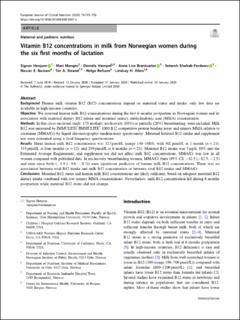Vitamin B12 concentrations in milk from Norwegian women during the six first months of lactation
Henjum, Sigrun; Manger, Mari Skar; Hampel, Daniela; Brantsæter, Anne Lise; Shahab-Ferdows, Setareh; Bastani, Nasser Ezzatkhah; Strand, Tor A; Refsum, Helga; Allen, Lindsay H.
Journal article, Peer reviewed
Published version

Åpne
Permanent lenke
https://hdl.handle.net/11250/2766442Utgivelsesdato
2020Metadata
Vis full innførselSamlinger
Sammendrag
Background: Human milk vitamin B12 (B12) concentrations depend on maternal status and intake; only few data are available in high-income countries. Objective: We assessed human milk B12 concentrations during the first 6 months postpartum in Norwegian women and its association with maternal dietary B12 intake and maternal urinary methylmalonic acid (MMA) concentration. Methods: In this cross-sectional study, 175 mothers, exclusively (80%) or partially (20%) breastfeeding, were included. Milk B12 was measured by IMMULITE®/IMMULITE® 1000 B12 competitive protein binding assay and urinary MMA relative to creatinine (MMA/Cr) by liquid chromatography-tandem-mass spectrometry. Maternal habitual B12 intake and supplement use were estimated using a food frequency questionnaire. Results: Mean human milk B12 concentration was 327 pmol/L (range 140-1089), with 402 pmol/L at 1 month (n = 21), 333 pmol/L at four months (n = 32), and 299 pmol/L at 6 months (n = 21). Maternal B12 intake was 5 µg/d, 89% met the Estimated Average Requirement, and supplement use did not affect milk B12 concentrations. MMA/Cr was low in all women compared with published data. In exclusively breastfeeding women, MMA/Cr (beta (95% CI) -42.5 (-82.5, -2.5) and time since birth (-4.9 (-9.6, -0.3)) were significant predictors of human milk B12 concentrations. There was no association between total B12 intake and milk B12 concentration or between total B12 intake and MMA/Cr. Conclusions: Maternal B12 status and human milk B12 concentrations are likely sufficient, based on adequate maternal B12 dietary intake combined with low urinary MMA concentrations. Nevertheless, milk B12 concentration fell during 6 months postpartum while maternal B12 status did not change.